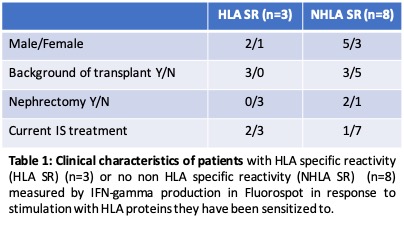Regulatory T Cells Suppress Memory IFN-Gamma Production in Highly Sensitised Patients
1King's College London, London, United Kingdom, 2Viapath Clinical Transplantation Laboratory, Guy's Hospital, London, United Kingdom
Meeting: 2022 American Transplant Congress
Abstract number: 1268
Keywords: Alloantigens, Highly-sensitized, Kidney transplantation, T cells
Topic: Basic Science » Basic Science » 10 - Treg/Other Regulatory Cell/Tolerance
Session Information
Session Name: Treg/Other Regulatory Cell/Tolerance
Session Type: Poster Abstract
Date: Monday, June 6, 2022
Session Time: 7:00pm-8:00pm
 Presentation Time: 7:00pm-8:00pm
Presentation Time: 7:00pm-8:00pm
Location: Hynes Halls C & D
*Purpose: Highly sensitized patients (HS) present worse long-term outcome after transplantation compared to those without donor-specific antibodies (DSA). It has been suggested that desensitisation using anti-CD19 depleting agents do not have satisfying long term outcomes, as they remove B cells with a regulatory phenotype (“Bregs”). In vitro anti-donor IFNγ production correlates with progression of graft dysfunction and fewer regulatory Tcells (Tregs) in patients with chronic rejection. This project aims to understand B cells/Tregs interactions in HS patients.
*Methods: We prospectively recruited HS patients on dialysis, isolated their Tregs and expanded these cells using established protocols (Interleukin-2 + Rapamycin). IFNγ production by CD8-depleted PBMC (+/- additional depletion of CD19+ cells) in response to HLA proteins (PureProt®) was tested in Fluorospot to assess the memory immune alloresponse at baseline and when Tregs were added.
*Results: Out of 16 patients recruited, 10/16 patients (63%) had a background of transplantation with a nephrectomy in 4/10 and 4/10 (25%) were still receiving immunosuppressive drugs. We managed to expand Tregs from 11 patients (Table 1). Three patients had IFNγ production in CD8-depleted PBMCs challenged with an HLA protein they had been sensitised to (HLA Specific Reactivity group = “HLA SR”). Autologous ex vivo expanded Tregs regulated IFNγ production in 1/3 patients (Figure 1A). When CD19- were depleted, 5/10 patients presented an increase of IFNγ production (4 of those with no response from CD8-depleted PBMC) (Figure 1B). Interestingly, autologous ex vivo expanded Tregs managed to regulate IFNγ production in 5/5 (100%) of these patients.
*Conclusions: Autologous ex vivo expanded Tregs are able to regulate IFNγ production in HS patients when the B cells are depleted, but not when the B cells are present. This demonstrates complex interactions between B cells, Tregs and Teffectors. The determinants of these molecular relationships are currently under investigation.
To cite this abstract in AMA style:
Dudreuilh C, Basu S, Shaw O, Burton H, Domingo-Vila C, Tree T, Lombardi G, Scotta C, Dorling A. Regulatory T Cells Suppress Memory IFN-Gamma Production in Highly Sensitised Patients [abstract]. Am J Transplant. 2022; 22 (suppl 3). https://atcmeetingabstracts.com/abstract/regulatory-t-cells-suppress-memory-ifn-gamma-production-in-highly-sensitised-patients/. Accessed February 24, 2026.« Back to 2022 American Transplant Congress


